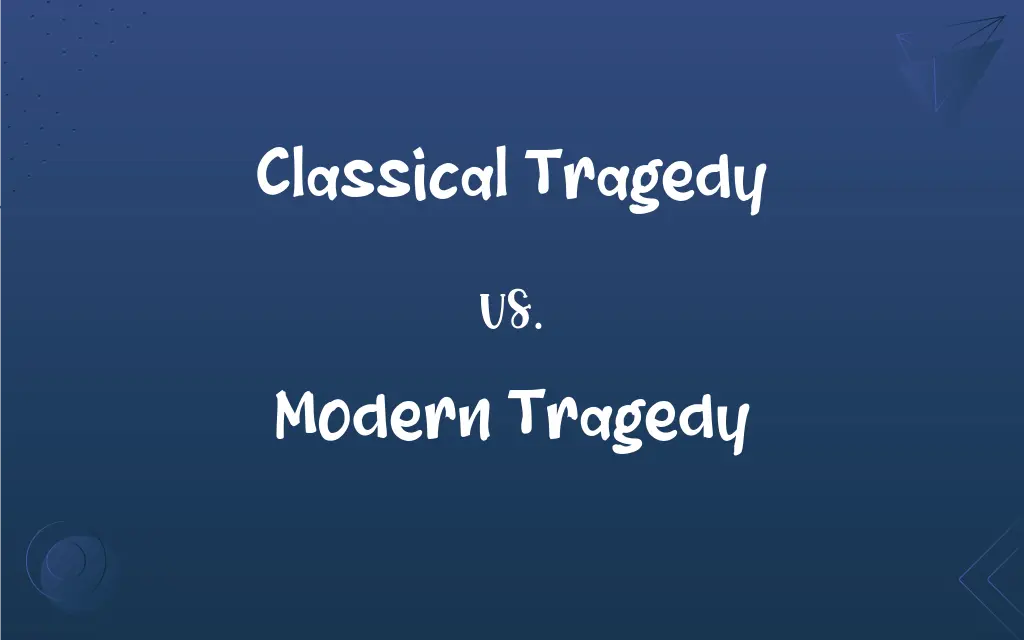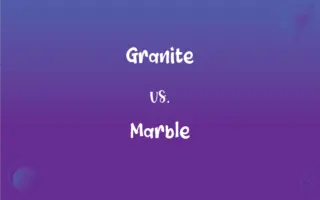Classical Tragedy vs. Modern Tragedy: What's the Difference?
Edited by Aimie Carlson || By Harlon Moss || Updated on October 3, 2023
Classical tragedy adheres to strict forms, and moral lessons, featuring heroic individuals, while modern tragedy often breaks traditional molds, focusing on ordinary people and psychological elements.

Key Differences
Classical Tragedy mainly revolves around figures of high rank or larger-than-life qualities, confronting unavoidable despair or death as a result of their own errors or flawed decisions. Modern Tragedy, on the other hand, can focus on characters from any social status, often showcasing everyday individuals experiencing personal downfalls.
Classical Tragedy often incorporates supernatural elements, prophets, gods, or fate that inevitably influence the protagonists’ destinies. Modern Tragedy may embrace more realistic scenarios or psychological complexities, highlighting human internal struggles and socio-political issues.
Classical Tragedy often adheres to rigid structures, like the three unities (time, place, and action) and utilizes formalized dialogues like stasimon and episodion. Modern Tragedy typically refrains from sticking to such stringent forms, often breaking the fourth wall and employing diverse storytelling techniques.
Classical Tragedy mostly ends with a resolution, albeit one that results in death or despair, providing a moral or cautionary lesson. Modern Tragedy may resist offering clear resolutions, often leaving moral questions open-ended, and outcomes bleak or ambiguous.
Classical Tragedy, frequently embodied by Greek plays, uses choruses to narrate, comment, or advise protagonists, providing a communal voice that connects deities with mortal struggles. Modern Tragedy often rejects such narrative devices, emphasizing individual perspectives, and may employ technologies or internal monologues to convey thoughts and themes.
ADVERTISEMENT
Comparison Chart
Character Status
Generally high status or heroic figures
Often features common, ordinary individuals
Supernatural Elements
Commonly present
Less prevalent or metaphorical
Structure
Adheres to strict forms and unities
Flexible, varied forms
Resolution
Typically clear and moralistic
May be ambiguous or unresolved
Narrative Technique
Employs choruses, formal dialogues
Utilizes diverse, often intimate techniques
ADVERTISEMENT
Classical Tragedy and Modern Tragedy Definitions
Classical Tragedy
Classical tragedy utilizes chorus to convey narratives or moral commentary.
The chorus in Medea reflects societal perspectives and foreshadows grim events, aligning with classical tragedy’s format.
Modern Tragedy
Modern tragedy often features everyday individuals.
Willy Loman, in Death of a Salesman, exemplifies modern tragedy as a common man experiencing profound despair.
Classical Tragedy
Classical tragedy often involves noble, doomed heroes.
Oedipus, in Oedipus Rex, epitomizes classical tragedy through his catastrophic downfall from a revered king to an outcast.
Modern Tragedy
Modern tragedy might explore psychological and societal dilemmas.
A Streetcar Named Desire explores Blanche’s mental deterioration, depicting a poignant modern tragedy.
Classical Tragedy
Classical tragedy often explores themes of fate and destiny.
In The Iliad, Achilles’ destiny towards death is a poignant theme, illustrative of classical tragedy.
Modern Tragedy
Modern tragedy doesn’t always provide clear moral resolutions.
Waiting for Godot lacks a clear, moralistic ending, underscoring its modern tragic nature.
Classical Tragedy
Classical tragedy elicits fear and pity, aiming for catharsis.
Agamemnon evokes pity for its tragic hero, solidifying its status as a classical tragedy.
Modern Tragedy
Modern tragedy often discusses individual isolation and existential angst.
The alienation of Gregor Samsa in The Metamorphosis paints a vivid picture of modern tragedy.
Classical Tragedy
Classical tragedy usually adheres to a strict, formal structure.
Antigone unfolds in a singular location and time frame, honoring the unity of place and time in classical tragedy.
Modern Tragedy
Modern tragedy may employ non-linear narratives and various stylistic approaches.
The Glass Menagerie uses memory and non-linear structures, defining its style as a modern tragedy.
FAQs
What role does the chorus play in classical tragedy?
The chorus in classical tragedy often provides narration, commentary, and moral insights, linking the audience and the story.
What defines a classical tragedy?
Classical tragedy typically features a noble, heroic protagonist who encounters misfortune due to their own flaws or errors.
What role does fate play in classical tragedy?
Fate often functions as an unavoidable force leading the protagonist to their inevitable downfall in classical tragedy.
What is catharsis in the context of classical tragedy?
Catharsis refers to the emotional release or purification experienced by the audience through pity and fear.
Does modern tragedy explore psychological complexities?
Absolutely, modern tragedy often delves deeply into characters’ psychological struggles, examining their internal worlds and conflicts.
Can you give an example of a classical tragedy?
"Oedipus Rex" by Sophocles is a quintessential example of classical tragedy.
How is the protagonist different in modern tragedy compared to classical tragedy?
In modern tragedy, protagonists are often ordinary people, as opposed to the noble or heroic figures typically found in classical tragedy.
Can a classical tragedy be adapted into a modern tragedy?
Yes, adaptations can transform classical tragedies into modern ones by altering characters, themes, and structures to fit contemporary contexts.
What characterizes a modern tragedy?
Modern tragedy often features ordinary individuals, explores psychological and societal themes, and may lack clear moral resolutions.
Is "Death of a Salesman" considered a modern tragedy?
Yes, "Death of a Salesman" is a prominent example of modern tragedy, focusing on the common man, Willy Loman.
Does modern tragedy adhere to the three unities (time, place, action)?
No, modern tragedy often breaks from traditional forms, including the three unities, exploring varied narrative techniques.
Is societal commentary prevalent in modern tragedy?
Yes, modern tragedy often explores societal issues and critiques, discussing themes like capitalism, mental health, and social isolation.
Why does classical tragedy often involve characters of high status?
Classical tragedy uses high-status characters to amplify the scale and impact of their downfall, enhancing the tragic effect.
Does modern tragedy employ various storytelling techniques?
Yes, modern tragedy often uses a range of storytelling techniques, including non-linear narratives, flashbacks, and internal monologues.
Can classical tragedies involve common people as protagonists?
Though not traditional, classical tragedies could potentially feature common people if other thematic and structural criteria are met.
How do societal expectations influence modern tragedy?
Modern tragedy often explores how societal expectations and norms can impact individuals, contributing to their struggles and downfalls.
Is death a necessary component of classical tragedy?
While death is common, the crucial element is the downfall or suffering of the protagonist in classical tragedy.
How does the resolution in modern tragedy contrast with classical tragedy?
Modern tragedy may present ambiguous or unresolved endings, whereas classical tragedy tends to offer clear, moralistic resolutions.
Are the themes in classical tragedy relevant today?
Yes, themes like fate, freewill, and morality from classical tragedy remain relevant, exploring universal human experiences.
Can a story set in contemporary times be a classical tragedy?
While unusual, a contemporary story that adheres to classical tragedy’s structures, themes, and character arcs could be considered as such.
About Author
Written by
Harlon MossHarlon is a seasoned quality moderator and accomplished content writer for Difference Wiki. An alumnus of the prestigious University of California, he earned his degree in Computer Science. Leveraging his academic background, Harlon brings a meticulous and informed perspective to his work, ensuring content accuracy and excellence.
Edited by
Aimie CarlsonAimie Carlson, holding a master's degree in English literature, is a fervent English language enthusiast. She lends her writing talents to Difference Wiki, a prominent website that specializes in comparisons, offering readers insightful analyses that both captivate and inform.































































